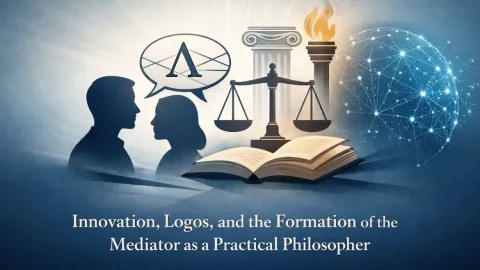The Elephant in the Room - Part 1
September 6, 2017
Every year hundreds, if not thousands, of seats are sold on mediation training courses in Ireland and the UK alone. Most of these courses end with motivated, excited and passionate new mediators going out into the world looking to do their bit to change how conflict is dealt with. What they have usually not been told, and often don’t realise, is how few of them will end up working regularly in mediation.
All of us who work in this field are passionate about what we do and why we do it. But that passion can quickly turn into frustration when we print out business cards and set up our website and the phone stays quiet. A few throw in the towel quickly, others persist for a while before giving up. The elephant in the mediation training room is that there is just not enough work out there for all the mediators that are being trained. Those of us involved in training all know that a mediation qualification is not enough to generate mediation work and some courses sometimes oversell the likely benefits of their training. The oversupply of mediators in relation to the amount of work available is not something trainers want to talk about, not just because it will turn away participants but also because it is hard to see the enthusiasm of new mediators dampened and their efforts frustrated. But is this different from any other professional or career pursuit? If you train as a solicitor, executive coach or a pilot can you walk straight into a job or will clients be looking to hire you straight away?
Sounds gloomy doesn’t it? Maybe, but it does not have to be. The other side of that coin is the many many mediators I know that have thriving mediation practices, are referring work on to colleagues because they are over stretched – yes really – and who are living the dream that we all had when starting out down this path. We have a number of choices therefore – we can shrug our shoulders and give up, being grateful for the work we do have, work on raising awareness of mediation and generally promoting the mediation option so as to generate more work, wait for our governments to do so (don’t get me started on that one) or, figure out how those mediators who are successful make a living from mediation.
What is it that distinguishes those mediators who get work and make money from those who struggle to do so?
Is it training, experience, connections?
Is it because they know they right people, because, dare I say it, they are lawyers?
Because they live in large urban centres or can afford to spend money on a fancy website?
No, I don’t think so. I think it is more complex than that, and, at the same time, simpler. I think those who are successful are those who are really good at marketing their service. That sounds logical but is more complex than we might think.
Many new mediators have chosen their path to make a difference, to help people, to change the way we think about conflict and to develop their skills and self awareness. And maybe, marketing our business and our services feels a little uncomfortable for that reason, because we are here to help, rather than to earn money. Marketing therefore, can be difficult, feel awkward, and is easily left to the bottom of the to-do list. For many, having those cards printed and the website set up ticks the marketing box. Surely the calls will come. But there is much more to marketing and promoting a mediation business than that.
What is it then, how does one market a mediation business successfully? I decided to do a little research on what it is that successful mediators do differently and what lessons we can learn from them. This has resulted in some interesting insights, and left me reassured that, while there may not be the abundance of freely available mediation work yet, there is a lot we can do to access the work that there is, and some lessons we can give our trainees on their way into the mediation world too. I will share these with you, but next month…in the mean time, how do you get your work and sell your services? Do you enjoy it or do you run a mile from marketing? It is worth thinking about…
You may also like










John Sturrock
Thank you Sabine. This is very thoughtful and I look forward to next month. There is another angle. We, in Core, have just completed a really great Residential Summer School, entitled Using Mediation Skills as Leaders. We had a wonderfully diverse group of senior and not-so-senior participants. They all got a huge amount out of it. Very few will go on to become full-time (or even perhaps part-time) mediators. However, they will take the essence of what we do as mediators back into their organisations, firms, cases and communities and they will transform situations. That is worthwhile in itself. It may even be more beneficial in the longer term.
Nokukhanya Ntuli
Thank you for the article. I wrote a similar article in 2015. https://www.linkedin.com/pulse/mediation-training-doing-more-harm-than-good-nokukhanya-nox-ntuli It seems that training is an income generating avenue for many mediators. But i think the lack of work our there creates a problem not only of saturation of the industry but of varying quality of mediators which can sometimes damage the image of the profession.
Charlie Irvine
Spot on about the marketing point. Freelance mediators, like freelance anything else, need to be pretty entrepreneurial (and good) to make a decent living. The only caveat I would want to add is that there can be other reasons for doing a mediation course. Some of my ex-students now work for not-for-profit mediation organisations where presumably the marketing is done by others. And others are doing a range of interesting jobs where it's very helpful to have an in depth understanding of human conflict - HR, management, education, lawyering, and pretty much anything else!
Odeta Inte
Dear Sabine, You are absolutely right. The same situation in Lithuania. We have new law on mediation. In near future, all families (with some exceptions) before starting divorce procedure at the court would have to meet with mediator. At this moment in Lithuania we have “mediation spring” – almost everyone who works with the family issues (lawyers, psychologists, social workers and etc.) seeking to become a mediator. Seats are sold on mediation training, too.
Charalambos Macheras
Excellent article! Generating a lot food for thought!